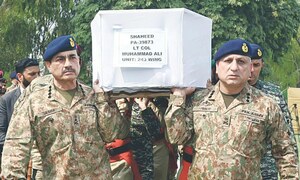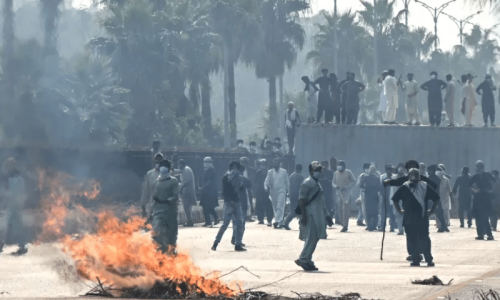LONDON: There was a time when Vladimir Putin was relaxed about Nato’s expansion, when China was eager to engage with the West and when Britain had a strong leader who wanted a closer embrace of Europe.
A portrait of that very different time emerges in thousands of newly released pages of UK government documents covering the period 2000-2002, with Labour prime minister Tony Blair at the zenith of his powers.
Already back then, Blair was concerned about people in Britain left behind by globalisation as he responded to the shock first-round breakthrough of the far-right Jean-Marie Le Pen in France’s presidential election of April 2002.
In a handwritten note on an aide’s email, Blair says that “in a world of change, people want some re-assertion of traditional values”, and that his government is right to confront working-class concerns about immigration and welfare.
The debate then foreshadows some of the factors that drove a narrow majority of Britons to vote in 2016 for Brexit, nine years after Blair stepped down.
Nevertheless, Blair is keen elsewhere in the papers to prepare the path
for Britain’s entry into the euro — an aspiration eventually nixed by his finance minister and successor Gordon Brown.
The Cabinet Office papers, divulged by the National Archives under Britain’s “20-year rule” governing official releases, cover the contentious election of US president George W. Bush, 9/11, the invasion of Afghanistan and the build-up to that of Iraq. The British lobby for an early invitation to Washington to meet Bush and his new team, to build on Blair’s rapport with outgoing president Bill Clinton.
“The extreme right and extreme left would work to pull the UK and US apart, as would other countries like Russia and France,” Britain’s ambassador in Washington Christopher Meyer cables after a meeting with vice president-elect Dick Cheney in Jan 2001.
“The prime minister was determined to avoid that happening.” That determination would see Blair march into Afghanistan with Bush after the 9/11 attacks, and, fatally for his party’s unity, into Iraq in 2003.
Chinese quips
Also in January 2001, a Downing Street memo summarises Blair’s contacts with Putin, who was then less than a year into his first presidency of Russia.
“On Nato, Putin told the (UK) prime minister in Moscow that he did not want to be viewed as anti-Nato and would not try to slow down the process of Nato enlargement,” the memo notes — while adding that defence minister Igor Sergeyev was in “flat contradiction” on that.
The papers show UK ministers and businesses keen to profit from China’s communist leaders’ embrace of market reforms through the World Trade Organisation.
In April 2001, Blair writes to president Jiang Zemin to mediate over the fate of the crew of a US spy plane held by China following a mid-air collision with a Chinese fighter.
Bush would later send a handwritten note thanking Blair for his help, after Beijing released the US crew.
But the general tone of Sino-Western relations was more positive.
“You asked about the state of UK-/China relations,” Blair is told by his foreign policy team in Nov 2002.
“The short answer is that they are very good — and the Chinese think so too.”
The motive for Blair’s request was that month’s convocation of a Chinese Communist Party congress that ushered in a leadership transition from Jiang to Hu Jintao.
China’s leaders were already shifting to a higher diplomatic profile.
September 2002 saw premier Zhu Rongji meet Blair at a UN summit in Johannesburg.
“During pleasantries, Zhu quipped that, although his job was difficult, he had one advantage over the prime minister,” a Downing Street memo summarised afterwards.
“He did not have to deal with an opposition party.” According to the memo, Zhu believed that Saddam Hussein in Iraq must abide by UN resolutions and permit weapons inspections.
“But China opposed military strikes against Iraq,” the premier was quoted as telling Blair.
“These were likely to have consequences we could hardly imagine. He urged patience and wisdom.”
Published in Dawn, December 31st, 2022














































Dear visitor, the comments section is undergoing an overhaul and will return soon.